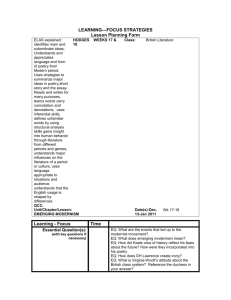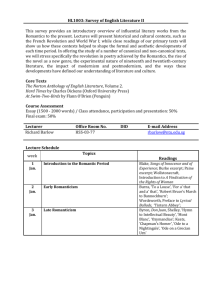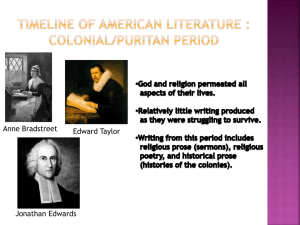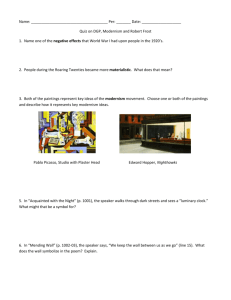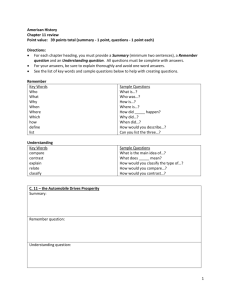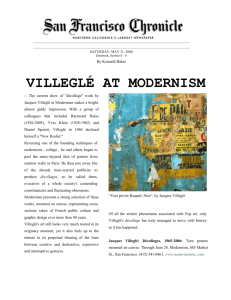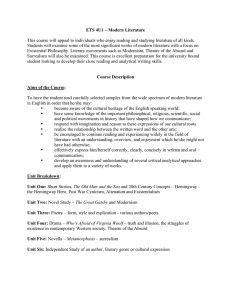ENGL 2323 Spring 2016 Revised with inserts.doc
advertisement
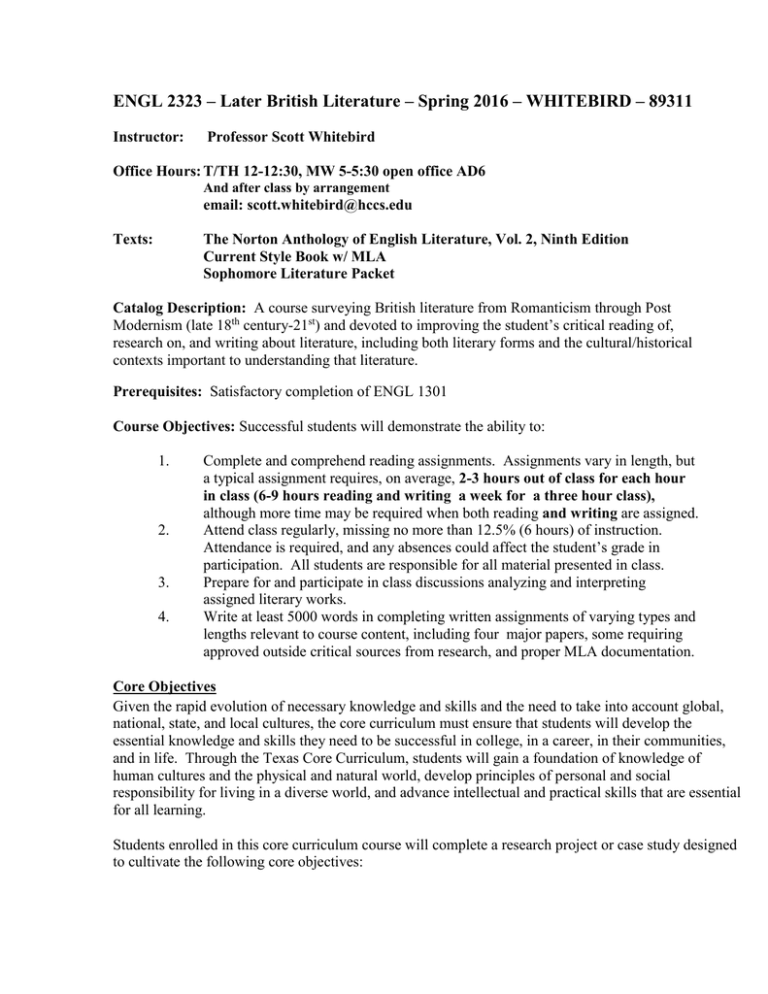
ENGL 2323 – Later British Literature – Spring 2016 – WHITEBIRD – 89311 Instructor: Professor Scott Whitebird Office Hours: T/TH 12-12:30, MW 5-5:30 open office AD6 And after class by arrangement email: scott.whitebird@hccs.edu Texts: The Norton Anthology of English Literature, Vol. 2, Ninth Edition Current Style Book w/ MLA Sophomore Literature Packet Catalog Description: A course surveying British literature from Romanticism through Post Modernism (late 18th century-21st) and devoted to improving the student’s critical reading of, research on, and writing about literature, including both literary forms and the cultural/historical contexts important to understanding that literature. Prerequisites: Satisfactory completion of ENGL 1301 Course Objectives: Successful students will demonstrate the ability to: 1. 2. 3. 4. Complete and comprehend reading assignments. Assignments vary in length, but a typical assignment requires, on average, 2-3 hours out of class for each hour in class (6-9 hours reading and writing a week for a three hour class), although more time may be required when both reading and writing are assigned. Attend class regularly, missing no more than 12.5% (6 hours) of instruction. Attendance is required, and any absences could affect the student’s grade in participation. All students are responsible for all material presented in class. Prepare for and participate in class discussions analyzing and interpreting assigned literary works. Write at least 5000 words in completing written assignments of varying types and lengths relevant to course content, including four major papers, some requiring approved outside critical sources from research, and proper MLA documentation. Core Objectives Given the rapid evolution of necessary knowledge and skills and the need to take into account global, national, state, and local cultures, the core curriculum must ensure that students will develop the essential knowledge and skills they need to be successful in college, in a career, in their communities, and in life. Through the Texas Core Curriculum, students will gain a foundation of knowledge of human cultures and the physical and natural world, develop principles of personal and social responsibility for living in a diverse world, and advance intellectual and practical skills that are essential for all learning. Students enrolled in this core curriculum course will complete a research project or case study designed to cultivate the following core objectives: o Critical Thinking Skills—to include creative thinking, innovation, inquiry, and analysis, evaluation and synthesis of information o Communication Skills—to include effective development, interpretation and expression of ideas through written, oral and visual communication o Personal Responsibility—to include the ability to connect choices, actions, and consequences to ethical decision-making o Teamwork (Comp I, Comp II, and TW)—to include the ability to consider different points of view and to work effectively with others to support a shared purpose or goal o Social Responsibility (Lit Only)—to include intercultural competency, knowledge of civic responsibility, and the ability to engage effectively in regional, national, and global communities Student proficiency in Communication Skills will be assessed as a formal written out-of-class essay, which is at least 3 pages long and which includes an oral presentation component as well as a visual component. Student proficiency in Critical Thinking will be assessed by a formal out-of-class essay assignment. Personal, Social Responsibility, and Teamwork will be assessed as part of long unit or major essay assignment, which will include assigned reading responses, pre-writing activities, multiple drafts, and group activities (such as peer review or group presentations). Student project grades will account for at least 5% of the final course grade. English Program Student Learning Outcomes (Composition, Literature, Creative Writing, and Technical Writing) 1. Write in appropriate genres using varied rhetorical strategies. 2. Write in appropriate genres to explain and evaluate rhetorical and/or literary strategies employed in argument, persuasion, and various genres. 3. Analyze various genres of writing for form, method, meaning, and interpretation. 4. Employ research in academic writing styles and use appropriate documentation style. 5. Communicate ideas effectively through discussion. English Literature Student Learning Outcomes 1. 2. 3. 4. 5. Explain and illustrate stylistic characteristics of representative works. Connect representative works to human and individual values in historical and social contexts Demonstrate knowledge of later British Literature. Analyze literary texts of later British Literature. Critique and Interpret representative literary works. Out of Class Work All out of class work, including homework, must be typed or computer printed, double spaced with title page (instructor example) and in correct MLA form. An essay package should contain title page, final draft, rough draft, and SOURCE VERIFICATIONS for all outside critical sources. Please staple or paperclip, and clearly label your Final Draft, and enclose all materials in a brown clasp envelope with your name on the outside. Paper topics will be discussed in class; all papers except the first will require at least one good outside critical source, perhaps more, properly documented. The first paper should be 2+ laser print pages (750 words minimum)the second should be 1000 words,the third should be 4-5 pages (1500 word minimum) with at least one good critical source, the fourth paper will be a minimum of 2000 words (6+ laser pages) Turn in both rough and final drafts clearly demonstrating and proving the development of your work. Copies of original critical sources quoted, paraphrased, or summarized are required, with the REFERENCED MATERIAL CLEARLY HIGHLIGHTED. No papers accepted without SOURCE VERIFICATIONS (Library Of Congress/Copyright page, plus page(s) quotes, paraphrases, and summary notes highlighted; full internet printout with clear address string identifying publisher, or web home page identifying publisher). Turn in both rough and final drafts clearly demonstrating, proving development of your work. A draft without a clearly identifiable student Rough Draft may not be accepted, or may incur a major deduction. Enclose all materials in a clasp envelope with your name on it. NOTE: A good critical source should include quotes from the primary source (work of literature being examined) with citations (page numbers) in the text. Additionally, most good sources also reference the work of other critics with citations in the text. A good critical source completes documentation with a proper Works Cited or Bibliography page. Among the kinds of sources that are NOT good would be those titled or subtitled with Outline, Overview, Survey, Notes On, Background, Summary, and/or Excerpt. For literary research, many to most dot.com sites are NOT good sources. Beware of student papers or class discussions/postings from other educational institutions. READING QUIZZES Students should be ready for reading quizzes or in-class writing on the days readings are due. Partial or full readings are fair game. Quizzes will be short (10-20 minutes) and may either be short answer) or may take the form of short in class writing (10-20 minutes). TEAM AND GROUP ACTIVITIES As assigned. Monsters in Beowulf (also:Monsters in Beowulf) by (World Literature student’s Name) ENGL 2323 Later British Literature Professor Whitebird February 1, 2014 CLASS POLICIES ATTENDANCE AND WITHDRAWAL Attendance is required. You are responsible for ALL materials covered in class. In addition, HCCS has an attendance policy. You may miss no more than 12.5%, or six class hours, or the instructor may drop you for non-attendance or require makeup work. Should you have to miss class, you are still responsible for all material covered. As soon as you can, be sure to get the name and phone number of a fellow student to contact. You may also leave me a message on my voicemail at 718-5678 – although we should see each other regularly at class. Should you stop attending class, it is your responsibility to withdraw from class, or you may receive an “F.” TARDINESS AND LEAVING EARLY Anything more than occasional tardiness is not acceptable. Students arriving late must make sure that class roll is correct by seeing the teacher after class. Leaving early should be cleared/explained to instructor prior to leaving in the middle of class. Questions already answered and topics covered will not be repeated during class time and remain the student’s responsibility. CLASS PREPARATION Preparation is also required. Students should know calendar and syllabus information, and should bring their syllabi to class. Assignments should be read and considered prior to class, and re-read if necessary so that you can participate in class. Expect occasional quizzes. Take notes in class; review them regularly. LATE WORK Late work costs points. Ten points off for one or two days late;20 points off for 2-7 days. No papers accepted more than ONE week late. Unusual lateness caused by illness, death in the family, and/or other emergencies must be explained in writing, and documented if possible. Papers will be collected at the beginning of class and are late after that. Papers turned in on the specified date but after papers have been collected will be penalized 5 points MAKE-UP WORK If you know you must miss an exam for a good reason, we can schedule a make-up time. Quizzes generally CANNOT be made up. SCHOLASTIC DISHONESTY (PLAGIARISM, COLLUSION, CHEATING) The student handbook lists cheating, plagiarism, and collusion as scholastic dishonesty. It defines plagiarism as “the appropriation of another’s work and the unacknowledged incorporation of that work in one’s own written work offered for credit.” It defines collusion as “ the unauthorized collaboration with another person in preparing written work for credit.” Possible punishments are “a grade of 0 or f on the particular assignment, failure in the course, and/or recommendation for probation or dismissal from the College System.” See Student Handbook. NOTE: Teachers use computers regularly, and advanced searches make it quick and easy for us to check phrases, sentences, keywords, paragraphs, etc. Be HONEST, and be careful – GOOGLE RULES. 3-PEAT RULE Students who enroll for most credit CEU classes for a third time or more will be charged an additional $50.00 per semester credit hour and $3.00 per contact hour. SPECIAL ACCOMMODATIONS Any student with a documented disability (e.g. physical, learning, psychiatric, vision, hearing, etc.) who needs to arrange reasonable accommodations must contact the Disability Services Office at the respective college at the beginning of each semester. Faculty are authorized to provide only the accommodations requested by the ADA Support Services Office. EGLS3 -- Evaluation for Greater Learning Student Survey System At Houston Community College, professors believe that thoughtful student feedback is necessary to improve teaching and learning. During a designated time, you will be asked to answer a short online survey of research-based questions related to instruction. The anonymous results of the survey will be made available to your professors and division chairs for continual improvement of instruction. Look for the survey as part of the Houston Community College Student System online near the end of the term. TITLE IX OF THE EDUCATION AMENDMENTS OF 1972, 20 U.S.C. A§ 1681 ET. SEQ. Title IX of the Education Amendments of 1972 requires that institutions have policies and procedures that protect students’ rights with regard to sex/gender discrimination. Information regarding these rights are on the HCC website under Students-Anti-discrimination. Students who are pregnant and require accommodations should contact any of the ADA Counselors for assistance. It is important that every student understands and conforms to respectful behavior while at HCC. Sexual misconduct is not condoned and will be addressed promptly. Know your rights and how to avoid these difficult situations. Log in to: www.edurisksolutions.org . Sign in using your HCC student e-mail account, then go to the button at the top right that says Login and enter your student number Grading Scale Papers #1 Paper (Romanticism) 4 pages #2 Paper (Modernism) 5 pages #3 Paper (Post-Colonial) 5 pages #4 Paper Final Paper (Post Modernism) 5 pages Daily Quizzes, groups, Participation 80% (20%) (20%) (20%) (20%) 20% Paper # 1: Choose one artist – Shelley, Keats, or Hopkins – from the Romantic Period, And discuss how that artist exemplifies or illustrates Romanticism, and how our understanding of Romanticism helps us to understand the artist and his work. Consider both theme and style .4+ pages. (1500 words) Paper #2: Choose one Modernist artist – Yeats, Lawrence, Joyce, or Woolf – to examine. Analyze the author’s work as illustrating Modernism, and how the tenets of Modernism help us understand aspects of the author’s work. Consider both theme and style. 5 pages. (1800 words). Paper #3: This paper is different from the previous 2. Consider the authors from Munro through Heaney on your syllabus. Using at least five of these authors, but more if you want to discuss how these PostColonial Writers changed Modernism. 5 pages (1800 words). Paper #4: Using either the poets Boland, Muldoon, and Duffy or 3 of the 4 fiction authors Atwood, Rushdie, Kureishi, and Desai discuss Post Modernism. 5+ pages.(2000 words). ENGL 2323 – Later British Literature – WHITEBIRD –Spring 2016 –89311 Wk Date 1 2 3 4 5 Jan 19,21 276,28 Feb.2,4 9, 11 16,18 6 7 23,25 Mar.1, 3 8 9 10 8, 10 15,17 22,24 29,31 11 April5,7 12 12,14 13 19,21 14 26,28 15 16 May3,5 10,12 Monday Wednesday Intro. Romanticism, Blake Blake 112-135, (148-159) (Byron) Shelley 748-868 Shelley Keats 901-980 Keats (Browning) Hopkins 1546-1554 Hopkins 1554-9 Stevenson 1675-1704 Stevenson1704-19 TUES. PAPER #1 (Shelley, Keats, or Hopkins: ROMANTICISM) Yeats 2082-2115 Yeats Yeats WWI (Brooke,Sasoon,Owen) Modernist Manifestos 2056-2082 Joyce 2282-2313 Lawrence 2483-2495, Eliot 2521 SPRING BREAK Woolf 2155-2260 Woolf (Mrs. Dalloway) Woolf Woolf TUES PAPER #2 (Yeats, Lawrence, Joyce, or Woolf:MODERNISM) Rhys 2591,Gordimer 2789’ Smith 2598, Thomas 2697, Hughes 2808 Munro 2842 Soyinka 2735, Kureishi 2754 Ramajuan 2794,Walcott 2800-02,04, Braithwaite 2734, McKay 2721, Murray 2794, Heaney 2951 Nichols 2751 Intro. Coetzee 2982 Coetzee 2984, McEwan 3013 TUES. PAPER #3 (POST WW II,POST COLONIAL. Munro-Heaney) Boland 2997, Muldoon 3026, Duffy 3041 Atwood 2970, Rushdie 3000 Kureishi 3032 Desai 3046 FINAL PAPER DUE TUES, RETURNED THURS. PAPER #4 (Coetzee and McEwan; Boland, Muldoon, and Duffy; or Atwood, Rushdie, Kureishi, and Desai (at least 3 of 4): POST-MODERNISM).
